Africa’s healthcare system is undergoing a transformation with digital health record startups addressing challenges like fragmented data and limited infrastructure. These companies are improving patient care, streamlining operations, and expanding access through technology. Here are 10 standout startups leading this shift:
- Helium Health: A Nigerian platform offering offline-capable electronic medical records (EMR) and hospital management tools. It’s operational in Nigeria, Ghana, Liberia, and Senegal.
- Click Doc: A Moroccan SaaS solution integrating teleconsultation and modular EMR features, with a growing presence in West Africa.
- DataPathology: Based in Morocco, it uses AI for faster cervical cancer diagnosis and connects labs through cloud-based systems.
- DeepEcho: A South African company focused on cardiac care, combining AI-powered ultrasound technology with digital records.
- PocketDoc: A mobile-first platform from Morocco providing diagnostic tools, patient records, and clinical references for healthcare professionals.
- SehaLink: A Moroccan startup managing the entire patient journey, from bookings to digital health records, with plans to expand across North Africa.
- Sobrus: Operating in 14+ countries across Africa and Europe, this cloud-based platform supports over 627,000 patients and 32,000 healthcare professionals.
- TeleDoc Technologies: A multi-country platform combining telemedicine with EMR, serving Nigeria, Kenya, and Ghana.
- MOBicure: A Nigerian startup focusing on maternal and child health through its mobile app, OMOMi, which tracks immunizations and provides health education.
- 7thCare Technology: A Nigerian cloud-based EHR system simplifying patient record management with offline functionality and modular features.
These startups are leveraging AI, cloud systems, and mobile technology to bridge healthcare gaps, particularly in underserved regions. Their focus on regulatory compliance and data security ensures trust and scalability. Below is a quick comparison of their key features and reach.
Quick Comparison
| Startup | Core Focus | Countries of Operation | Key Features |
|---|---|---|---|
| Helium Health | EMR & hospital management | Nigeria, Ghana, Liberia, Senegal | Offline EMR, billing, analytics |
| Click Doc | SaaS EMR & teleconsultation | Morocco, West Africa | Modular platform, AI tools, teleconsultation |
| DataPathology | AI pathology & diagnostics | Morocco, DRC, Senegal | AI-driven cancer diagnostics, lab networks |
| DeepEcho | Cardiac care & ultrasound | South Africa, Kenya, Nigeria, Ghana | AI ultrasound, cardiac record integration |
| PocketDoc | Mobile medical assistant | Morocco | Mobile-first, diagnostic tools, clinical references |
| SehaLink | Patient journey digitization | Morocco, North Africa | Bookings, teleconsultation, digital records |
| Sobrus | Cloud-based health management | 14+ countries (Africa & Europe) | Scalable platform, multi-country deployment |
| TeleDoc Technologies | Telemedicine & EMR | Nigeria, Kenya, Ghana | Remote consultations, multilingual support |
| MOBicure | Maternal/child health | Nigeria, Africa | Mobile app, immunization tracking, health education |
| 7thCare Technology | Digital health records | Nigeria, Kenya, Ghana | Modular EHR, offline functionality |
These startups are reshaping healthcare delivery across Africa, offering scalable, secure, and accessible solutions to improve patient outcomes.
eFiche Featured on Africa Digital Health Networks Startup Watchlist 2025
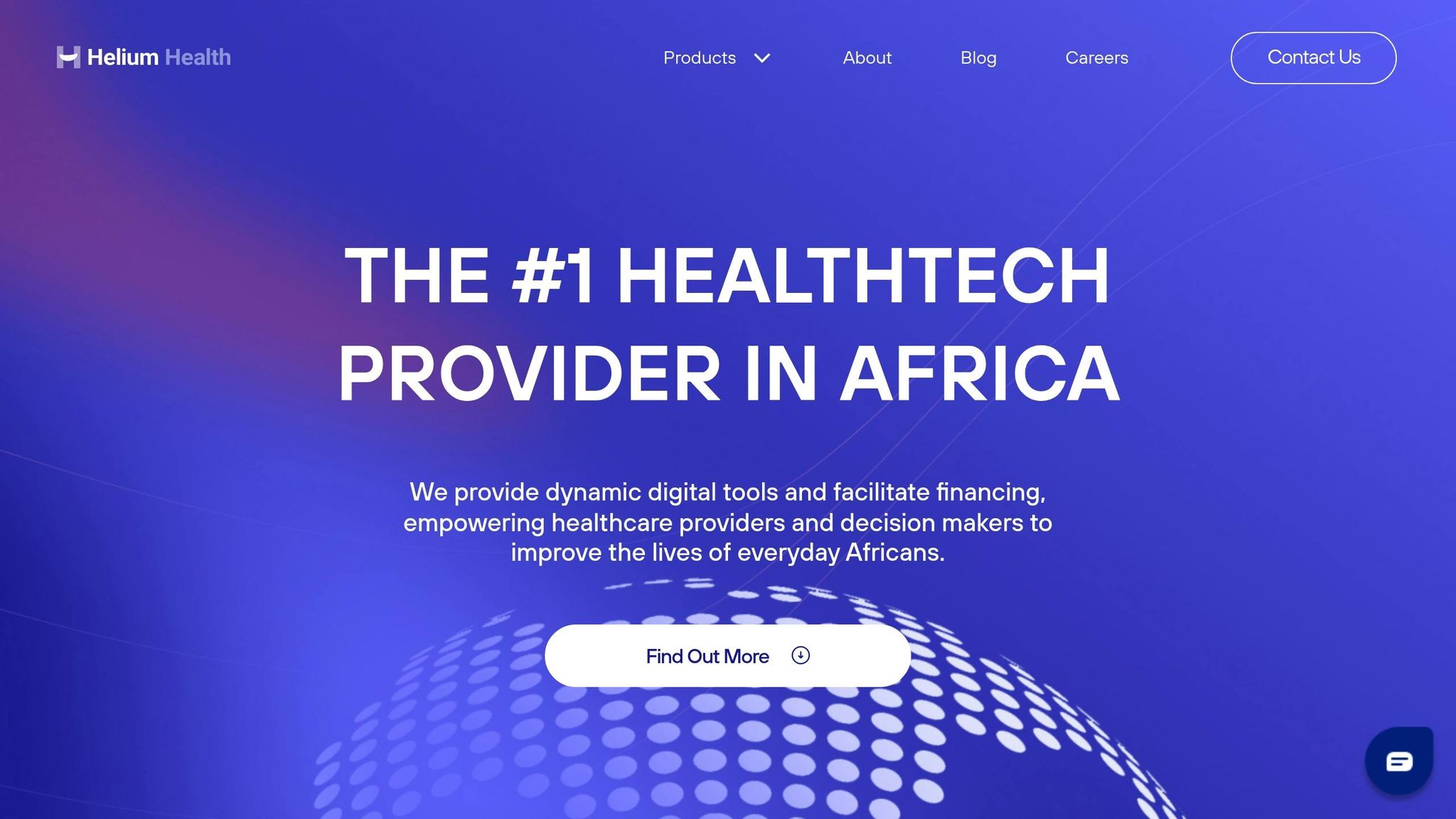
Helium Health, a trailblazing company founded in Nigeria, offers a platform tailored to meet the unique challenges of Africa’s healthcare landscape. One standout feature is its ability to operate in areas with unreliable internet – an essential capability for facilities in rural regions.
Digital Health Record Solutions
Helium Health’s electronic medical record (EMR) system is an all-in-one tool that integrates appointment scheduling, billing, inventory management, and analytics. A key differentiator is its offline functionality. Even when internet connections drop, healthcare workers can continue using the system. Once connectivity is restored, data syncs automatically, ensuring seamless operation.
Impact on Healthcare Outcomes
In Nigeria, Helium Health has partnered with major hospital networks, achieving impressive results in its first year. Administrative tasks were reduced by 30%, and patient throughput improved by 25%. By digitizing records, healthcare providers gain instant access to complete patient histories, enabling quicker and more accurate diagnoses. In Ghana, the platform’s automated reminders have boosted patient follow-up rates, particularly for chronic disease management, where consistent monitoring is critical.
Growth and Adoption Across Regions
Helium Health has expanded its reach across Nigeria, Ghana, Liberia, and Senegal, gaining a strong foothold in West Africa. The company has digitized millions of patient records and now supports hundreds of healthcare facilities. Its growth strategy relies on partnerships with both public and private entities, allowing it to scale effectively. This success is rooted in its ability to navigate local regulations and adapt to infrastructure challenges in each country.
Regulatory Compliance and Data Security
Helium Health prioritizes strict adherence to regulations, including Nigeria’s Data Protection Regulation (NDPR) and global standards like the GDPR. The platform uses encryption, secure authentication, and regular audits to safeguard patient information. Access to records is restricted to authorized personnel, with detailed audit trails ensuring accountability. Additionally, the company collaborates with local regulators in every market to maintain compliance with evolving healthcare data protection laws.
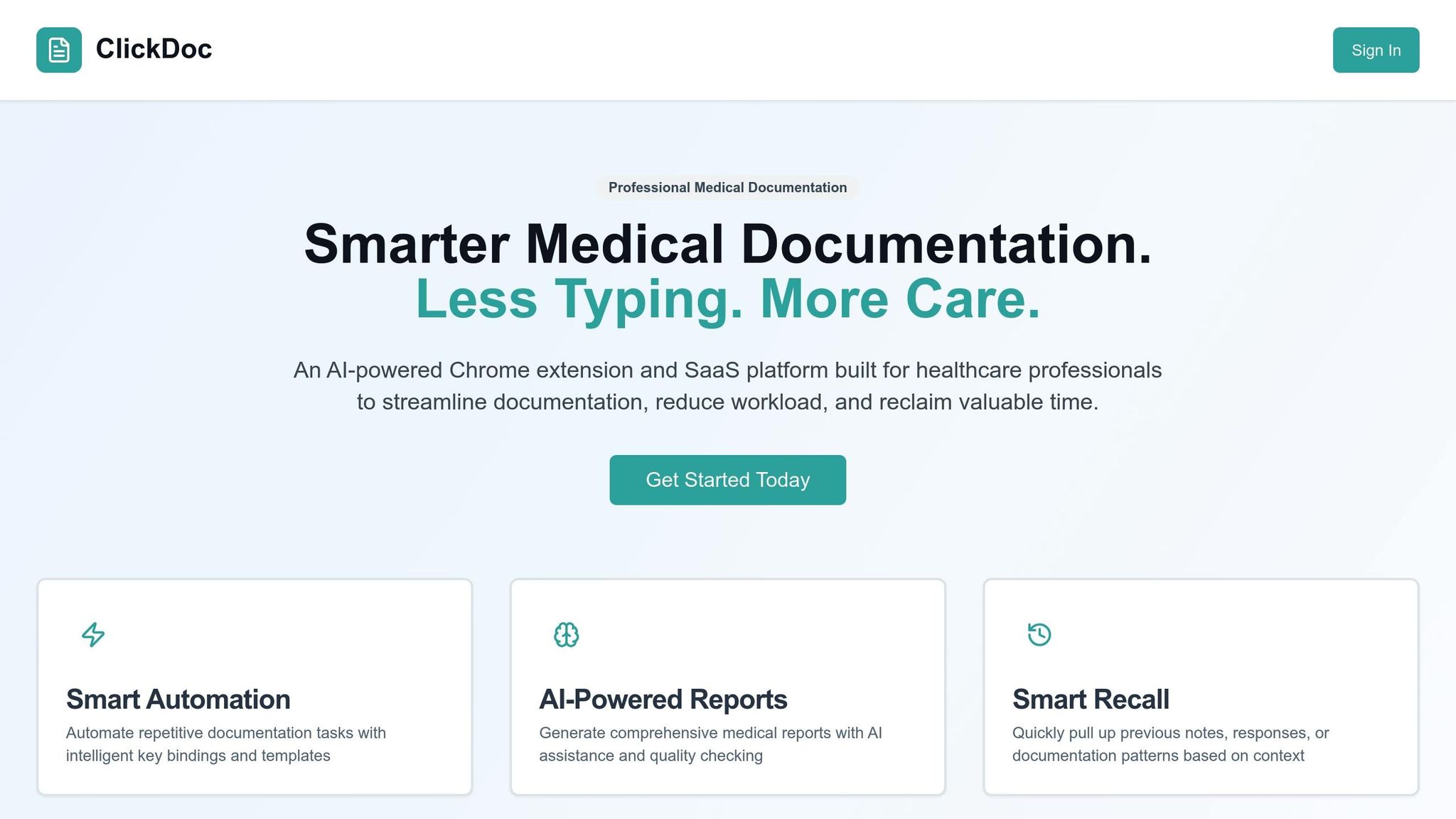
Click Doc provides a digital health records platform designed to bridge the gap between patients and healthcare providers. Delivered as a Software-as-a-Service (SaaS) solution, it combines electronic medical records with teleconsultation features. This setup allows patients to book both in-person and virtual appointments, while healthcare professionals can handle records, billing, and securely share data. The platform aligns with regional efforts to integrate digital records with telehealth services to improve patient care.
Digital Health Record Solutions
Click Doc uses a modular system to cater to a wide range of healthcare needs. This approach lets healthcare providers select specific features, including administrative tools, teleconsultation capabilities, electronic prescription management, and an AI-powered patient orientation tool. The modular design ensures the platform can adapt to the needs of facilities of different sizes and specialties.
Impact on Healthcare Outcomes
By integrating digital records with teleconsultation, Click Doc aims to make appointments more accessible and reduce administrative workloads for healthcare providers. The platform’s ability to provide seamless access to digital records for both virtual and in-person care supports continuity of care and enhances patient management efficiency.
Growth, Adoption, and Future Plans
Click Doc is already active in several markets and is focused on expanding its presence across West Africa. This growth strategy aims to tackle the region’s varied healthcare challenges and broaden access to their innovative solutions.
Regulatory Compliance and Data Security
The platform adheres to local regulations, such as Morocco’s Law 17-04, and prioritizes secure data sharing. Looking ahead, Click Doc plans to introduce additional modules, including a laboratory management component, to address the evolving needs of healthcare providers.
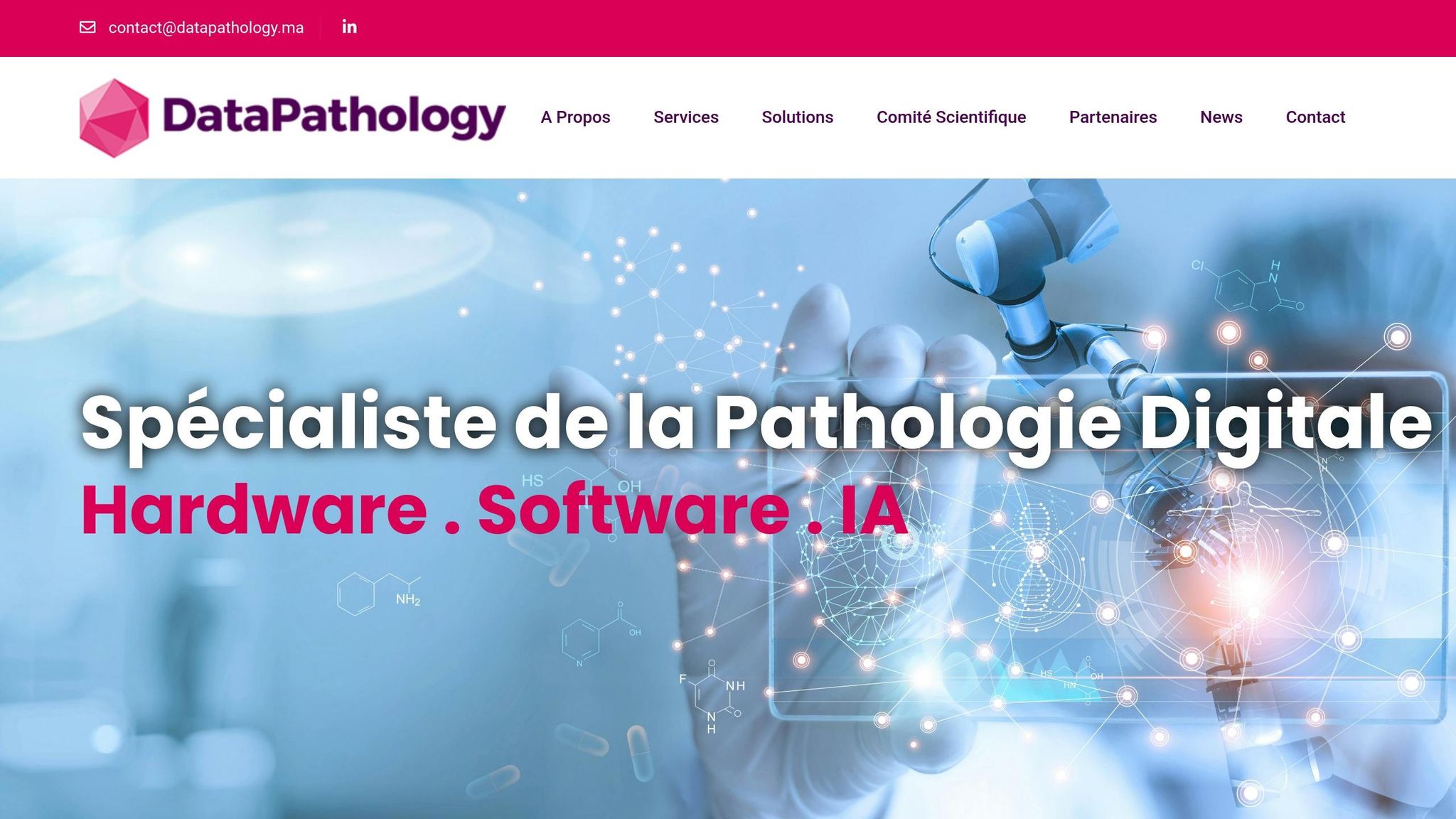
DataPathology is a Moroccan healthtech startup making strides in cervical cancer diagnosis across Africa through the use of artificial intelligence. Established in 2020, the company specializes in AI-powered pathology solutions designed to speed up cervical cancer detection. This innovative approach addresses a critical healthcare gap in Africa, where access to quality pathology services is often limited.
Digital Health Record Solutions
The company’s platform connects laboratories using a cloud-based Laboratory Information Management System (LIMS), simplifying workflows by securely storing, retrieving, and sharing patient data. For areas with unreliable internet access, the system also supports offline data entry, ensuring continuity of service.
A major focus of the platform is its AI-driven diagnostic tools, which are tailored for cervical cancer screening. These tools analyze pathology samples to deliver faster and more precise results. Healthcare providers can remotely access patient records, benefiting from a comprehensive digital trail that supports more effective treatment planning.
Impact on Healthcare Outcomes
DataPathology’s targeted approach to cervical cancer diagnosis has led to a 40% reduction in diagnostic turnaround times and improved the accuracy of patient records – key improvements for underserved communities.
The digital record system has also minimized the manual errors often associated with traditional pathology workflows. By providing healthcare professionals with access to complete patient histories, the platform enables more informed treatment decisions. Additionally, its ability to connect remote laboratories has brought expert diagnostic services to areas that previously lacked access, significantly improving patient care.
Growth and Adoption Across Regions
Building on these advancements, DataPathology has seen rapid growth. Between 2022 and 2023, the company secured $1.2 million in funding – $200,000 from Witamax and $1 million from Azur Innovation Fund – to expand its network of laboratories. In 2023, the startup extended its reach beyond Morocco to include the Democratic Republic of Congo and Senegal, aiming to bring cervical cancer screening and faster diagnostics to underserved populations. This expansion is part of a larger wave of digital health innovation sweeping across Africa, with healthtech startups projected to impact over 1.6 million people by 2025.
Regulatory Compliance and Data Security
DataPathology prioritizes data protection by adhering to both local and international health data standards, including GDPR and country-specific regulations. The platform employs encryption, strict access controls, and audit trails to safeguard patient information. By working closely with regulatory bodies in each country of operation, the company ensures compliance and builds trust among healthcare providers and patients. Regular updates to its security protocols further protect sensitive pathology data, emphasizing the ongoing evolution of digital health records in Africa.
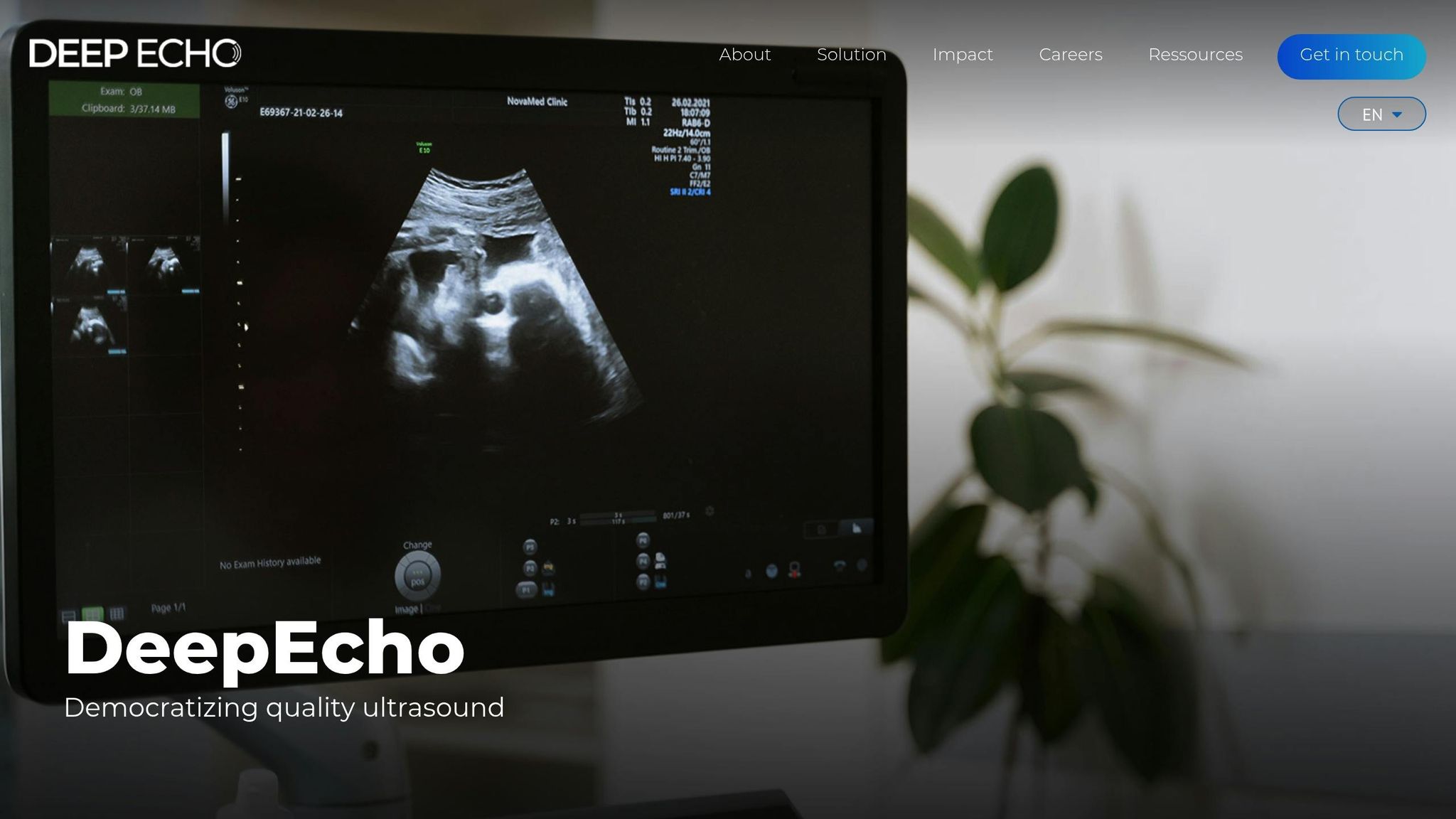
DeepEcho, a South African startup, is making waves in cardiac care by combining AI-powered ultrasound technology with digital record management. With Africa embracing digital transformation in healthcare, DeepEcho zeroes in on heart health, offering a much-needed specialized solution.
Digital Health Record Solutions
DeepEcho’s platform integrates seamlessly with hospital systems to store ultrasound images, diagnostic reports, and patient data securely in the cloud. It even works offline, syncing automatically once internet access is restored. This flexibility makes it suitable for a wide range of healthcare environments.
Through an easy-to-navigate dashboard, healthcare providers can access a patient’s complete cardiac history, including past ultrasound results, treatment plans, and follow-up schedules. The system also sends automated alerts, helping doctors stay on top of routine monitoring and intervene when necessary.
Impact on Healthcare Outcomes
DeepEcho sets itself apart by focusing exclusively on heart care, using digital records to streamline services and improve outcomes. Early deployments of its platform have already shown promise, boosting the quality of cardiac care. By blending AI-assisted diagnostics with detailed digital records, the platform enhances diagnostic precision and encourages proactive treatment approaches.
Growth and Adoption Across Regions
What started in South Africa is now spreading across the continent. DeepEcho has expanded into Kenya, Nigeria, and Ghana, tapping into key markets. With Series A funding secured, the startup is scaling its operations and partnering with healthcare facilities across the region.
Regulatory Compliance and Data Security
DeepEcho prioritizes data security and regulatory compliance. Its platform adheres to regional healthcare data protection laws, using encrypted storage, redundant backups, and undergoing regular security audits by independent experts. The AI diagnostic tools are rigorously validated to meet medical device standards and maintain high-quality performance, ensuring both safety and reliability.
5. PocketDoc
PocketDoc is transforming healthcare in Morocco and North Africa by offering a mobile-first solution for digital health records. Founded by Imad Chakri in Oujda, Morocco, the startup focuses on delivering essential medical tools and resources directly to healthcare professionals through their smartphones. This approach taps into the region’s growing reliance on mobile technology as a gateway to accessible healthcare.
Digital Health Record Solutions
At its core, PocketDoc functions as a mobile digital assistant, seamlessly combining patient records, diagnostic tools, and up-to-date clinical references into one easy-to-use platform. Its design simplifies clinical workflows, making it a valuable tool for healthcare providers, even in remote areas. By integrating real-time medical references, PocketDoc supports clinicians in making informed decisions on the spot. Beyond record management, the platform also emphasizes continuous medical education, equipping healthcare workers with the latest guidelines to enhance their practice.
Impact on Healthcare Outcomes
PocketDoc is making a real difference in regions with limited resources. By providing instant access to diagnostic tools and clinical references, the platform helps improve diagnostic accuracy and patient safety. Healthcare professionals report that this instant access reduces errors and enables better decision-making, especially in underserved areas. The combination of patient records and educational resources is closing critical knowledge gaps, empowering clinicians to deliver higher-quality care.
Growth and Adoption Across Regions
In March 2020, PocketDoc raised $25,000 in pre-seed funding, which fueled the platform’s development and extended its reach to more healthcare professionals. Adoption has been particularly strong in Morocco, where smartphone use among healthcare workers is surging. The mobile-first design is perfectly suited to the technological landscape in many parts of Africa, where smartphones are more common than desktop computers or tablets. This growth reflects the rising demand for accessible digital healthcare tools and the support of local innovation networks.
Regulatory Compliance and Data Security
PocketDoc places a high priority on secure data management, adhering to regional data protection standards to ensure patient confidentiality. Regular updates to its clinical content keep the platform aligned with evidence-based practices, reinforcing its trustworthiness and reliability among healthcare providers.
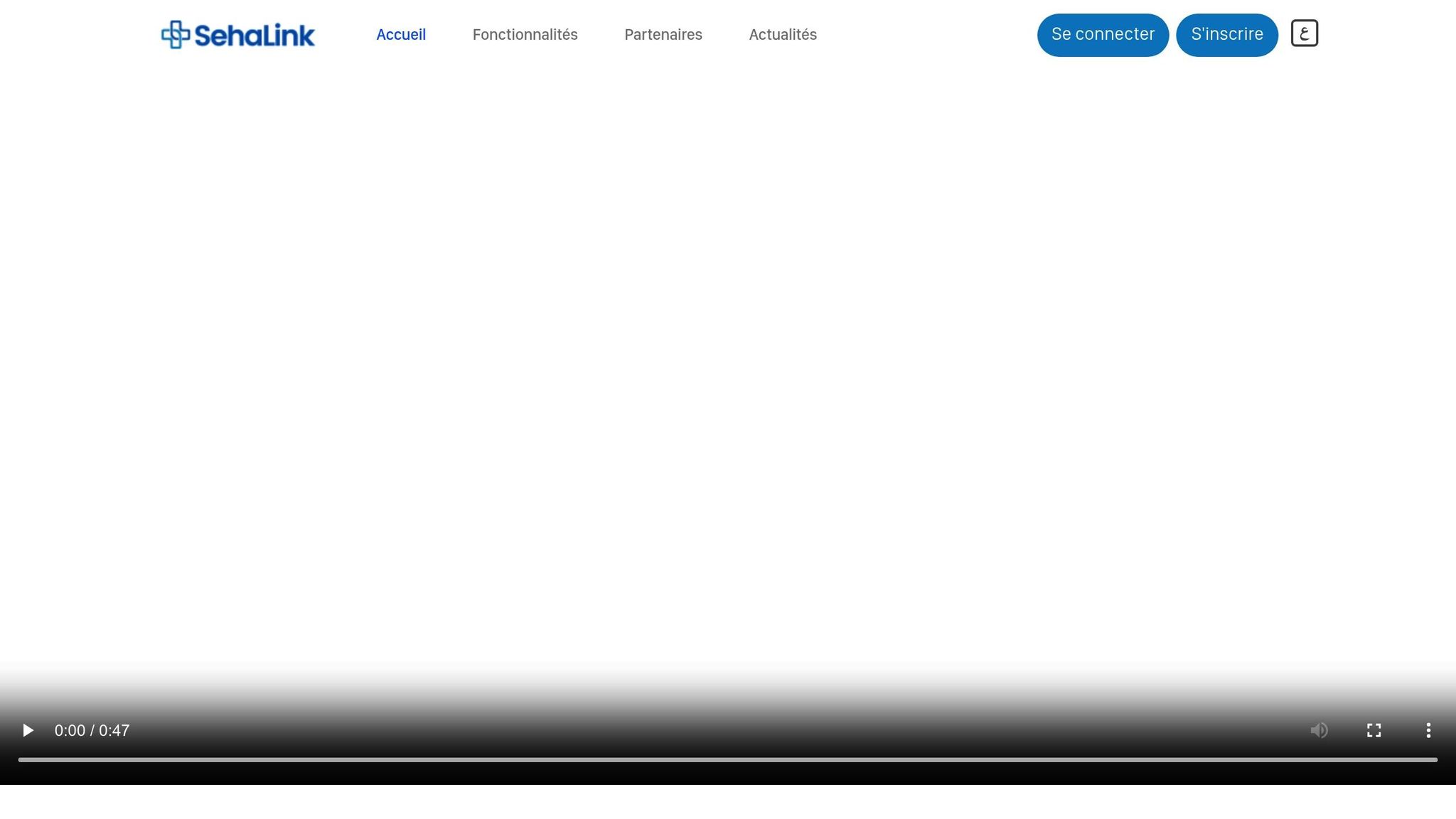
SehaLink is reshaping healthcare in Morocco with its all-in-one digital health platform. Established in 2020 by Sabrine Zahroubane and Maryem Renaja, this Moroccan startup focuses on digitizing every step of the patient journey. In 2023, the company rebranded from Ta7alil.ma to SehaLink.com, a move that signaled its ambitions for regional growth and deeper integration of digital health solutions.
Digital Health Record Solutions
SehaLink provides a seamless platform that manages the entire patient experience – from booking appointments to maintaining medical records. Patients can schedule in-person visits, teleconsultations, or even home consultations while securely accessing their health records online. For healthcare providers, the platform’s modular setup allows for custom configurations to suit their specific needs. Future updates, including laboratory integration and AI-powered patient orientation tools, aim to meet the growing demands of healthcare systems across Africa. These features promise to elevate the quality of care provided.
Improving Healthcare Access and Efficiency
By digitizing medical records and simplifying appointment scheduling, SehaLink reduces administrative bottlenecks and ensures smoother care delivery. Early users have reported greater satisfaction thanks to easier access to services and shorter wait times. The teleconsultation feature has been especially impactful in rural areas, where specialized care is often hard to come by.
Expanding Across North Africa
After establishing a solid presence in Morocco, SehaLink is now broadening its reach across North Africa. The rebranding marked the beginning of a new phase, one focused on modular upgrades and forming strategic partnerships in local markets. This progress has positioned the company as a key player in Africa’s healthtech space, with the potential to drive significant advancements in healthcare delivery.
Prioritizing Data Security and Compliance
SehaLink takes data protection seriously, employing encrypted storage and secure authentication measures to safeguard sensitive information. The platform is fully compliant with Morocco’s healthcare data regulations and is designed to adapt to local requirements as it expands into new regions. This commitment to security and compliance ensures trust among users and partners alike.
sbb-itb-dd089af
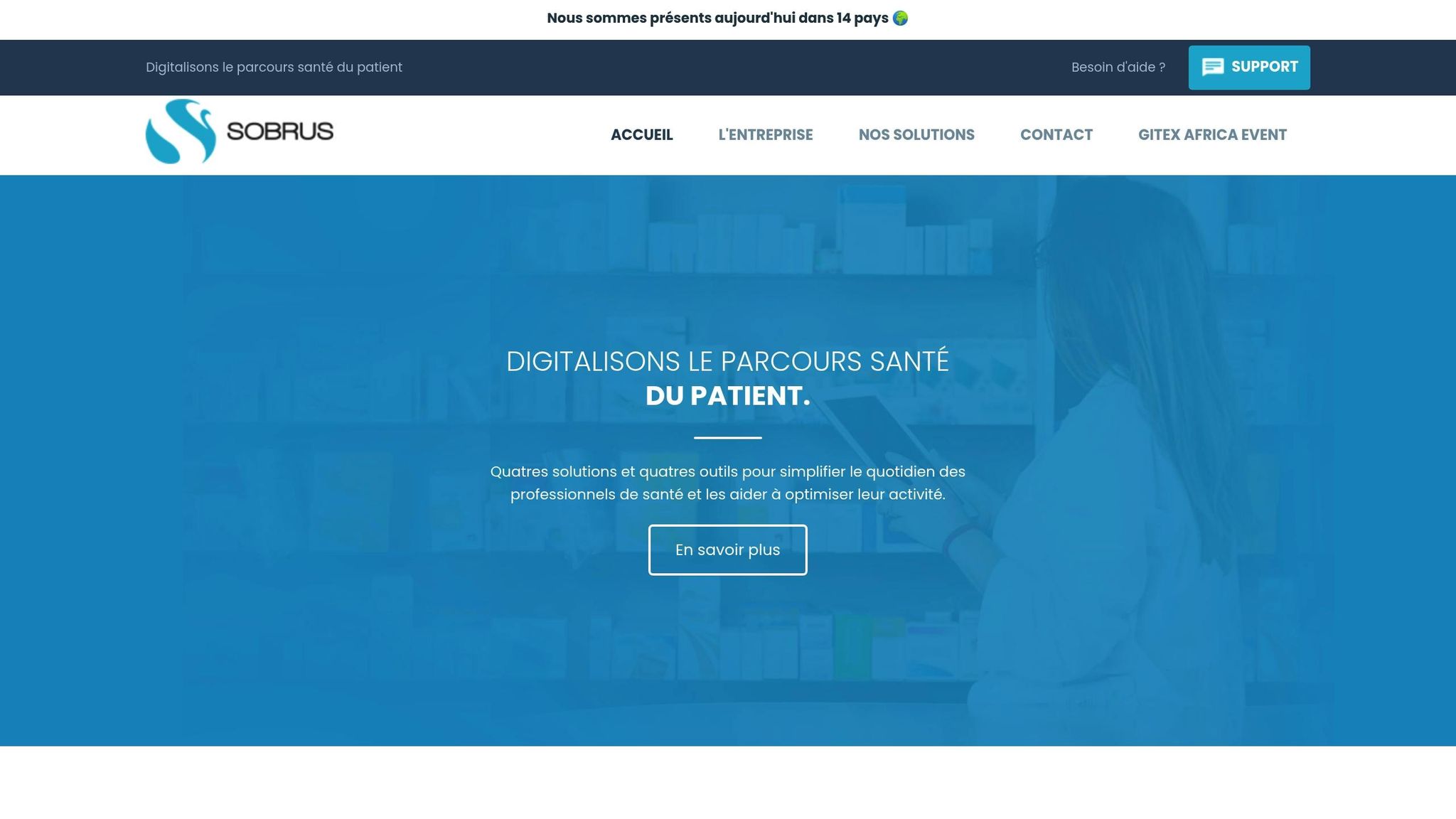
Sobrus, founded in 2012 by Omar Sefiani in Rabat, Morocco, has grown from a local healthcare digitization project into a cloud-based digital health platform that serves providers across Africa and Europe. Over the years, it has established itself as a trusted name in the African healthtech sector, with a track record of addressing the needs of healthcare professionals across continents.
Digital Health Record Solutions
At its core, Sobrus offers a cloud-based platform accessible via web and mobile, designed to simplify patient data management. The platform streamlines tasks like appointment scheduling, billing, and clinical coordination, fitting seamlessly into existing workflows. Whether accessed on a desktop or mobile device, the system provides real-time updates to keep healthcare professionals connected.
With Sobrus, professionals can access detailed patient histories, monitor treatment progress, and maintain comprehensive medical records. This level of integration helps improve care coordination across departments and specialties, making processes smoother and more efficient within healthcare facilities.
Impact on Healthcare Outcomes
Sobrus processes millions of requests monthly while supporting over 627,000 patients within its network. By digitizing patient records, the platform has significantly reduced administrative hurdles, minimized errors, and ensured that patient information remains consistently accessible. These improvements translate into better-informed clinical decisions and more seamless continuity of care.
Growth and Adoption Across Regions
The platform is now active in more than 14 countries across Africa and Europe, serving over 32,000 healthcare professionals and handling approximately 41,000 monthly requests. Sobrus’ success lies in its ability to adapt its solutions to different regulatory landscapes, languages, and healthcare practices. This adaptability has been key to overcoming the challenges associated with healthcare digitization in diverse regions. To support its broad reach, the company employs compliance frameworks that are flexible enough to meet the specific needs of each market.
Regulatory Compliance and Data Security
Sobrus prioritizes data protection by adhering to both local and international standards. Its secure cloud infrastructure uses encrypted data transmission and strict authentication protocols to safeguard sensitive patient information. Moreover, its modular compliance features allow the platform to adjust to country-specific regulations, ensuring that it remains reliable and secure across all the regions it serves.
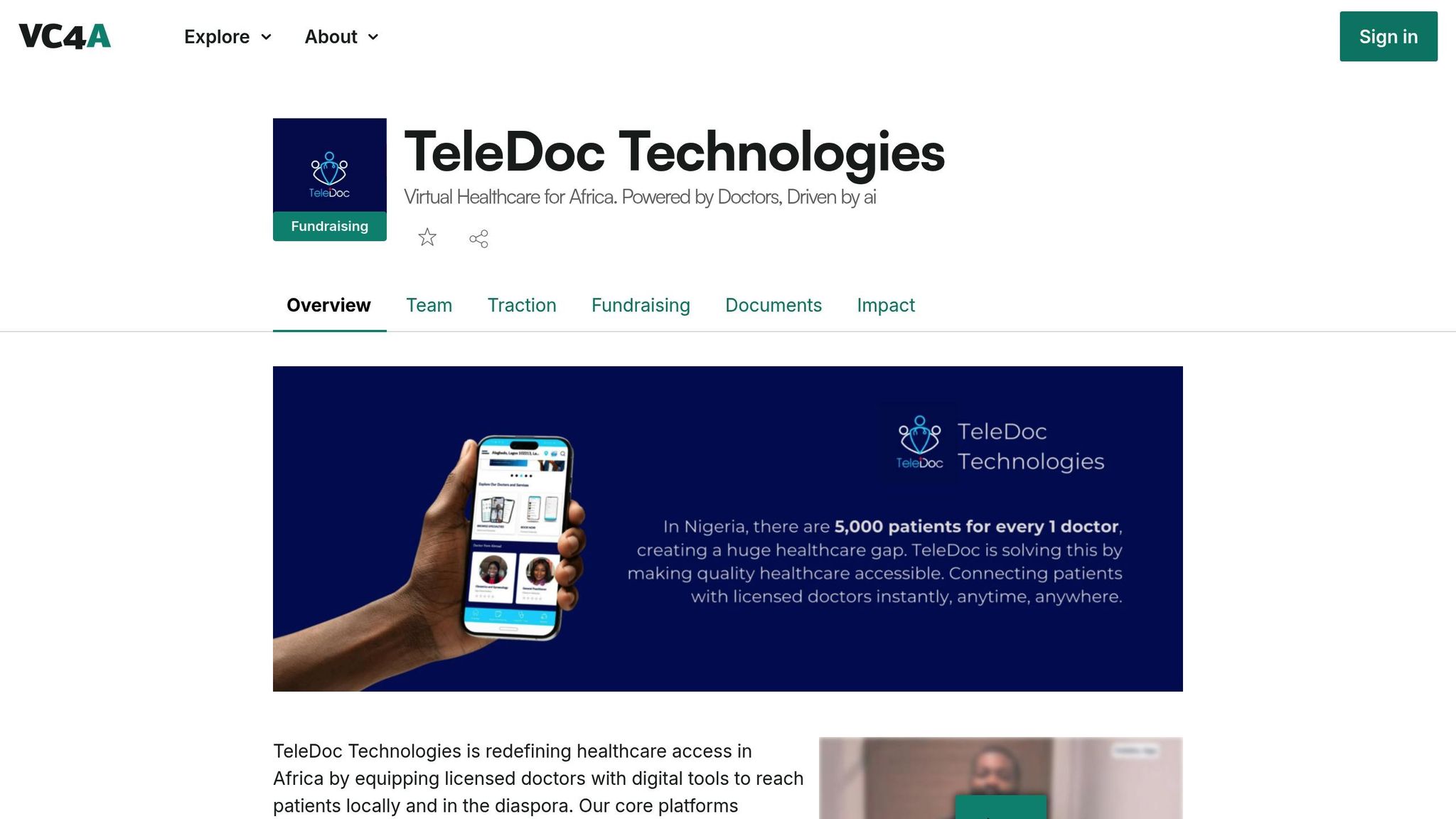
TeleDoc Technologies brings together digital health records and telemedicine into a single, seamless platform. Here’s a closer look at what makes it stand out.
Digital Health Record Solutions
This cloud-based system ensures patient data is synchronized in real time across multiple devices. Healthcare providers can access detailed patient histories, update records electronically, and streamline care coordination. Key features include electronic prescription tools, analytics dashboards, and customizable modules. The platform also supports multilingual functionality and offline data capture, making it versatile for diverse healthcare settings.
Impact on Healthcare Outcomes
The platform is already making a difference. For instance, a district hospital in Kenya saw a 40% drop in paperwork, better follow-up care for chronic patients, and smoother care coordination – all within six months. Clinics using TeleDoc Technologies have also reported up to a 30% boost in operational efficiency, along with higher patient satisfaction scores.
Growth and Adoption Across Regions
TeleDoc Technologies has gained traction in Nigeria, Kenya, and Ghana, partnering with both public and private healthcare providers. The platform currently manages over 500,000 patient records and supports more than 1,200 healthcare providers across these regions. Its growth strategy prioritizes rural healthcare by offering subsidized onboarding for clinics in underserved areas and providing comprehensive training for healthcare workers.
Regulatory Compliance and Data Security
To ensure data protection, TeleDoc Technologies employs end-to-end encryption and role-based access controls. The platform adheres to GDPR and local data privacy laws, with compliance modules tailored to specific country regulations. Regular security audits further strengthen its commitment to legal and privacy standards.
MOBicure has carved a niche in Africa’s digital health sector by prioritizing maternal and child health. Its flagship product, the OMOMi mobile app, is a testament to this focus. Founded in 2015 by Dr. Charles Akhimien, this Nigerian startup uses mobile technology to bridge healthcare gaps in underserved communities.
Digital Health Record Solutions
The OMOMi app functions as a digital health record platform tailored specifically for maternal and child healthcare. It allows users to track immunization schedules, monitor their child’s growth, and utilize symptom-checking tools – all from their smartphones. The app stores detailed health records that can be shared with healthcare providers, making consultations more efficient. Its mobile-first design leverages Africa’s widespread mobile phone usage, enabling healthcare professionals to access patient records, send immunization reminders, and conduct virtual consultations through integrated communication tools.
Impact on Healthcare Outcomes
By 2023, the OMOMi app had reached over 80,000 users across Nigeria and other African countries, significantly improving healthcare access in rural and low-income areas. The platform has supported over 100,000 health consultations and immunization reminders, directly contributing to better vaccination rates and early detection of childhood illnesses. In 2022, MOBicure partnered with the Edo State Ministry of Health in Nigeria to implement the app in public health centers. This collaboration led to a 15% increase in immunization coverage within just six months and provided maternal health education to more than 10,000 mothers. Encouraged by these results, MOBicure has continued to expand its services across the region.
Growth and Adoption Across Regions
In 2023, MOBicure joined a UNICEF-backed initiative in Lagos, Nigeria, offering digital health education and record-keeping services to over 5,000 mothers. This effort resulted in a 20% reduction in missed vaccination appointments and improved child health monitoring. MOBicure’s achievements have earned global recognition, including awards from the World Health Organization and the United Nations. The startup also won the prestigious World Summit Award for its contributions to digital health innovation.
Regulatory Compliance and Data Security
MOBicure operates in full alignment with Nigeria’s National Health ICT Strategic Framework, ensuring its solutions meet regulatory standards. The platform prioritizes data privacy and security, implementing robust measures to safeguard sensitive health information. This commitment to protecting user data has helped establish trust and reliability in its digital health offerings.
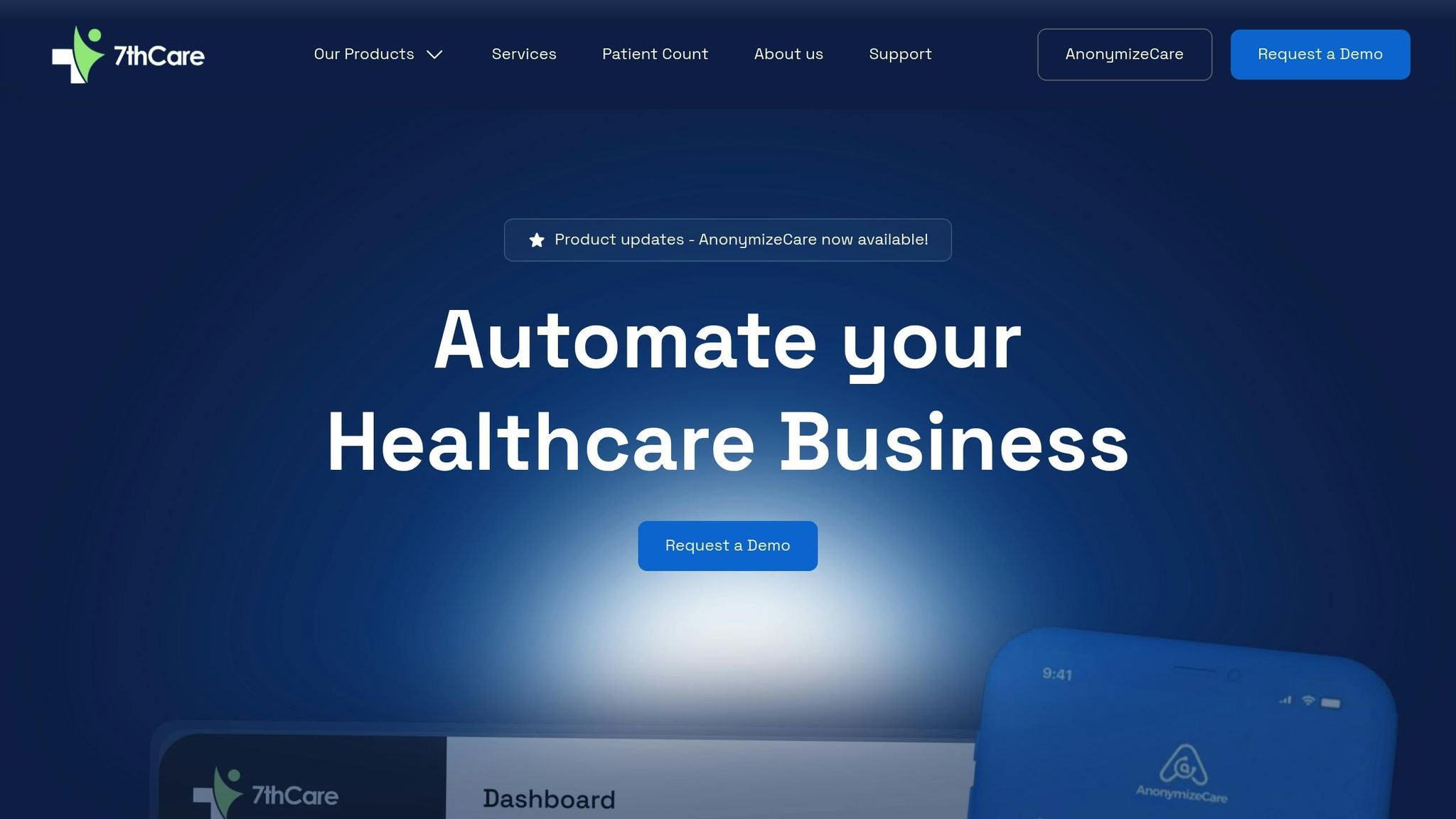
Founded in 2023 by Olalekan, Brienze, and Daniel, 7thCare Technology is a Nigerian startup focused on healthcare automation and data aggregation to improve service delivery.
Digital Health Record Solutions
7thCare Technology offers a cloud-based EHR platform that’s designed to be modular, giving clinics and hospitals the flexibility to pick and choose the features they need. This platform makes it easy for healthcare facilities to digitize patient records, manage appointment scheduling, and securely share data. Its mobile-first design, paired with offline functionality, ensures seamless operation even in areas with unreliable internet connectivity by syncing data automatically once back online. Beyond record management, the system covers a wide range of hospital operations, from patient registration to billing and inventory management, all while being intuitive enough for users with varying levels of digital experience.
These capabilities directly contribute to better care delivery and efficiency.
Impact on Healthcare Outcomes
The platform’s effectiveness has been evident in pilot programs. For instance, during a six-month trial with a network of clinics in Lagos, Nigeria, the system reduced patient record retrieval times by 30% and decreased prescription errors by 20%. Similarly, in rural Kenya, the platform improved vaccination tracking and follow-up rates, leading to better immunization coverage in underserved areas. Clinics using the system have reported shorter wait times, fewer errors in prescriptions, and better follow-up care. These improvements enable healthcare providers to make informed decisions and allocate resources more effectively.
Growth and Adoption Across Regions
Despite being a relatively new player, 7thCare Technology has quickly gained traction across Africa. Its solutions are already being used in Nigeria, Kenya, and Ghana, with pilot projects expanding into Francophone West Africa. This growth is fueled by partnerships with local health ministries, integration with national health insurance programs, and backing from international health NGOs. The company’s focus on adapting its platform to local languages and regional needs has been a key factor in its success. Recognized by HealthTech Hub Africa as part of its 2025 accelerator cohort, 7thCare Technology is being praised for its approach to digital health records and the tangible improvements it brings to healthcare delivery.
Regulatory Compliance and Data Security
Data security and regulatory compliance are top priorities for 7thCare Technology. The platform is built to meet the strict requirements of the US Health Insurance Portability and Accountability Act (HIPAA), giving it an edge over many regional competitors and setting the stage for potential global partnerships. It employs end-to-end encryption, role-based access controls, and regular security audits to safeguard sensitive patient data. Additionally, it adheres to national health data regulations in its operating countries and aligns with international standards like GDPR where applicable. By collaborating with local regulators and prioritizing transparency through clear privacy policies and staff training, 7thCare Technology fosters trust among both healthcare providers and patients.
Startup Comparison Table
The table below provides an overview of various startups and their core strengths, operational reach, and standout features. It showcases the variety of digital health solutions transforming healthcare across Africa.
| Startup | Core Focus | Countries of Operation | Key Features | Market Reach |
|---|---|---|---|---|
| Helium Health | EHR & hospital management | Nigeria, West Africa | Digital records, billing integration, analytics tools | Pan-African expansion |
| Click Doc | SaaS EHR & teleconsultation | Morocco, France, Côte d’Ivoire, Senegal | Modular platform, AI patient orientation, e-prescriptions | Expanding in West Africa |
| DataPathology | AI pathology & diagnostics | Morocco, DRC, Senegal | AI-powered lab diagnostics, connected lab networks | North & Central Africa |
| DeepEcho | Cardiac care & ultrasound | South Africa, Kenya, Nigeria, Ghana | AI ultrasound analysis, automated alerts, offline syncing | Multi-country African presence |
| PocketDoc | Mobile medical assistant | Morocco, North Africa | Diagnostic tools, medical references, patient management | Regional focus |
| SehaLink | Patient journey digitization | Morocco | Online booking, teleconsultation, digital record access, home care | National with expansion plans |
| Sobrus | Cloud-based health management | 14+ countries (Africa & Europe) | Scalable patient/provider platform, multi-country deployment | Large-scale multi-country network |
| TeleDoc Technologies | Telemedicine & EHR | Nigeria, Kenya, Ghana | Remote consultations, digital records | Multi-country African focus |
| MOBicure | Mobile health solutions | Nigeria, Africa | mHealth apps, maternal/child health focus | Regional |
| 7thCare Technology | Digital health records | Nigeria | EHR and patient management | West African focus |
Among these, Sobrus stands out with its broad operational scale, spanning over 14 countries in Africa and Europe. It exemplifies how African health tech startups can achieve extensive reach while maintaining quality.
Regional patterns reveal some interesting trends. Moroccan startups like Click Doc, DataPathology, and SehaLink are leveraging their geographic position to expand into both African and European markets. Meanwhile, Nigerian companies such as Helium Health and 7thCare Technology are concentrating on strengthening their presence in West Africa.
The technological focus varies widely, reflecting the diverse healthcare needs across the continent. For example, DataPathology utilizes AI for advanced cancer diagnostics, while 7thCare Technology offers robust digital health record solutions. These varied approaches address unique challenges in healthcare infrastructure across regions.
Additionally, regulatory readiness plays a crucial role in these startups’ growth. For instance, DeepEcho has achieved FDA clearance, positioning it for potential global market entry. Such milestones highlight the increasing sophistication of African health tech solutions and their readiness to expand beyond the continent.
Conclusion
The 10 digital health record startups we’ve explored are reshaping healthcare delivery across Africa by tackling long-standing issues in medical data management and improving access to patient care. Their solutions are addressing crucial gaps in healthcare systems while offering scalable platforms that reach millions.
The numbers speak for themselves: Sobrus, for example, supports over 600,000 patients, and regional cohorts have secured impressive funding – clear indicators of the sector’s rapid growth and economic impact.
AI and cloud technologies are at the heart of this transformation. Companies like DataPathology are using artificial intelligence to speed up cancer diagnoses, while Click Doc integrates AI to improve patient orientation and optimize healthcare workflows. DeepEcho’s AI-powered ultrasound platform, which has earned FDA clearance, highlights how African health tech is making strides on a global scale.
These advancements are paving the way for startups to expand their reach, both regionally and internationally. Many of these companies are stepping beyond their home markets to serve larger audiences across Africa and even globally.
Looking ahead, the future of digital health records in Africa will likely center on predictive analytics, advanced telemedicine, and interoperable platforms that work across borders. With growing investments from international organizations and support from local governments, the ecosystem is primed for further innovation and broader adoption.
The path to success will depend on collaboration between startups, healthcare providers, and governments to ensure regulatory compliance and seamless integration. Those that prioritize robust infrastructure, user-friendly designs, and strong partnerships will be best positioned to improve healthcare access and quality, especially in underserved and rural communities.
FAQs
How are African digital health record startups solving issues like fragmented data and limited healthcare infrastructure?
Digital health record startups across Africa are addressing hurdles like scattered data and inadequate infrastructure by turning to cloud-based platforms and mobile technology. These tools provide healthcare providers with a way to securely store, retrieve, and share patient records, even in regions where resources are scarce.
A key priority for many of these startups is interoperability – making sure various healthcare systems can work together without issues. By streamlining data access and improving the accuracy of medical records, these solutions are helping to elevate patient care and enable more informed decision-making throughout the healthcare network.
How does artificial intelligence enhance healthcare outcomes for African digital health record startups?
Artificial intelligence (AI) is reshaping healthcare for digital health record startups in Africa, offering tools to streamline operations and improve patient care. From managing patient records to analyzing data and predicting health trends, AI is helping these startups deliver care with greater precision and efficiency.
By detecting patterns in patient data, AI can anticipate potential health issues, paving the way for earlier interventions and tailored treatment strategies. It also supports healthcare providers by delivering real-time insights, a game-changer in areas where medical resources are scarce.
How do African digital health record startups maintain data security and comply with regulations across multiple countries?
African digital health record startups are making data security and regulatory compliance a top priority. They achieve this by employing advanced encryption methods to safeguard patient information. At the same time, they adhere to both local and international data protection laws, such as the GDPR and region-specific health data regulations, ensuring patient privacy remains intact.
Given the varied regulatory frameworks across Africa, these startups work closely with legal experts and policymakers in each region. By customizing their systems to align with specific legal requirements, they not only protect sensitive information but also build trust and position themselves for growth in new markets.






